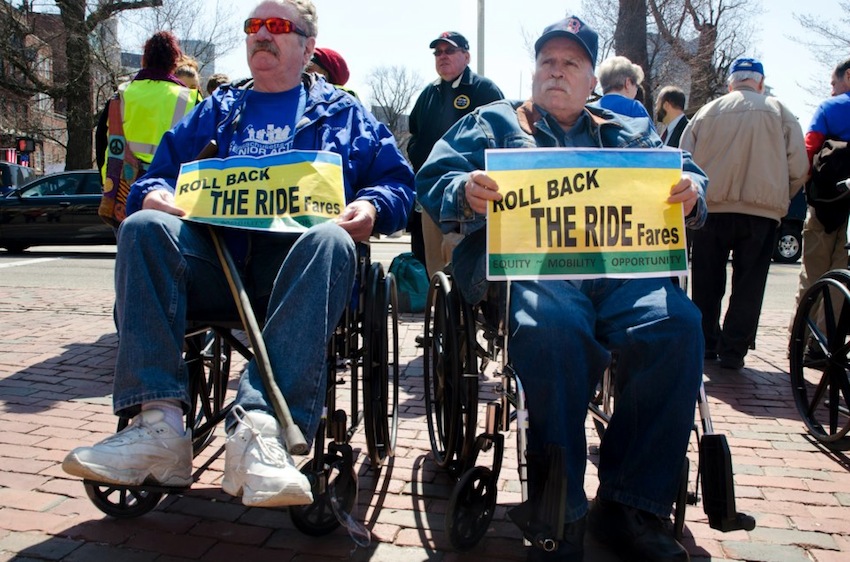Seniors Claim Small Victory in Battle Against MBTA Fare Increases
Senior public transit riders won a victory on Beacon Hill last week when the Senate pushed through an amendment that would essentially lower the cost to use the MBTA’s The RIDE, a para-transit option for elderly and disabled passengers.
For the last year, many riders that turn to the service, which offers door-to-door transportation for $4, have protested and demanded the cost be lowered, especially for those who don’t have enough income, or are below the poverty level.
The MBTA raised the price of The RIDE in 2012 to off-set operating costs. The price to use the system doubled, putting many seniors on a fixed income at a disadvantage because they couldn’t afford the steep increase. According to reports, use of The RIDE decreased dramatically since the price to take the services skyrocketed in 2012.
Last week, however, members of the Massachusetts Senior Action Council, a grassroots transportation advocacy group for elderly and disabled riders, celebrated a “huge step” forward after legislators included a package in the budget proposal that would cut the cost to take The RIDE by putting the transportation option on a tiered system. “What the amendment would actually do is create a protection for all elderly and disabled riders who depend on para-transit, and create an income-based tier structure,” says Carolyn Villers, executive director of the Massachusetts Senior Action Council.
The amendment would allow riders who qualify for The RIDE to pay the price of general bus fare, $1.50, if they fall below the poverty level. On the second tier, those who are slightly above the poverty line would pay the bus fare-and-a-half. Riders who make more than $34,000 annually would pay double the bus fare price, or roughly $4.
“It means in the MBTA area, fare would be lowered for about 85 percent of The RIDE users with greatest protections for those that are in the lower income bracket. I know that with many legislators, they feel that this is a reasonable approach to the ongoing problem. It’s an opportunity to protect the most vulnerable,” says Villers, adding that the proposal had 25 co-sponsors sign their names on in support of the measure. “This issue has deeply affected folks within our membership.”
Villers said some riders have been hopsitlaized because they had to choose between going to the doctors and tending to other tasks due to their limited income. Others, she says, have given up seeing family, and volunteering in their respective communities.
According to a statement from MBTA officials, the agency is prepared to work with other governmental agencies to examine the implementation of a needs-based fare system for RIDE customers.
Elderly and disabled riders put themselves on the line earlier this year when they took over and protested on Beacon Street outside of the State House. Members of the Senior Action Council and others rolled their wheelchairs into the middle of the roadway, blocking traffic, and refused to move until their concerns about lowering the cost to use The RIDE were heard. The protest led to several arrests. It was one of many protests the group has held since the fare increases were first implemented in July of 2012.



